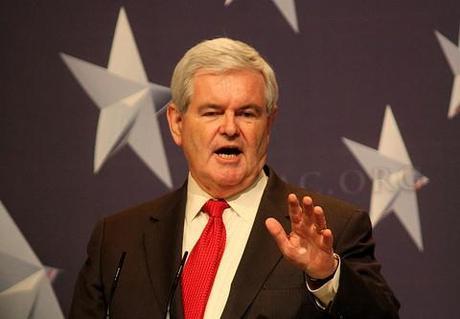
Newt Gingrich: Immigration issues? Photocredit: Gage Skidmore, http://www.flickr.com/photos/gageskidmore/4393323094/sizes/m/in/photostream/
The US presidential race is hotting up, with this week’s GOP nationally televised foreign policy debate. The twelfth debate in six months, and moderated by Wolf Blitz of CNN, it was, by all accounts, lively, and, according to Globalpost, “productive’’, even if it’s become something of a “reality show.” It did show that the Republican party doesn’t have a unified national security vision.
Differences abounded among the eight candidates: between withdrawing from Afghanistan, foreign aid to Pakistan, and illegal immigration in the United States. Before the debate it was widely held that Newt Gingrich and Mitt Romney were the best candidates: now, with some comments by Gingrich about illegal immigrants being allowed to stay, that’s not looking so sure any more. Even so, said Michael Medved on The Daily Beast, Gingrich and Romney are still the “only real contenders.”
The New York Times said that the one thing that they did tend to agree on was a “hawkish” stance in relation to Iran and terrorist attacks. Globalpost opined that the candidates largely looked out of their depth, reverting to “pat, feel-good answers that made decent sound bites but did little to elucidate their positions.” They also mostly seemed to advocate water-boarding – apart from Congressman Ron Paul, and former Ambassador to China, John Huntsman, two candidates whose opinions were the most left-field. Though Huntsman “excelled”, said Boston.com, it wasn’t enough to push him into the frontrunners; Paul also did very well, according to politics professor Daniel W Drezner on NPR.
Bruce Klingner on Heritage however said that none of the candidates even bothered to address something that’s possibly the most important issue of all: Asia, with China only mentioned in passing, and North Korea completely ignored.
So how did the main candidates fare?
“I’m prepared to take the heat, to say let’s be humane in enforcing the law without giving them citizenship, but by finding a way to create legality so that they are not separated from their families,” said Newt Gingrich, quoted on the NY Times.
Newt Gingrich: The former speaker of the House of Representatives, said Jennifer Rubin on The Washington Post, did not impress, and also made himself some serious problems with immigration issues. He said he wasn’t keen on deporting the 11 million illegal immigrants already in America – which isn’t going to impress his party base, and allowed Bachmann and Romney to gain points over him. He also wasn’t good on foreign policy, nor did he defend defence spending. He did say that he’d be supportive of an Israeli strike on Iran. On the contrary, said Andrew Gully on AFP, his “solid” performance has “cemented” his place as a serious rival to Romney. It remains to be seen how his immigration stance resonates with the more right wing parts of his party.
“Pakistan is a nation, that it’s kind of like too nuclear to fail,” said Michele Bachmann, quoted on Reuters.
Michele Bachmann: The Representative for Minnesota “exceeded expectations”, said Rubin, being “poised, informed and knowledgeable,” making clear her stance on China, Iran and Pakistan – she supports foreign aid to the latter, insisting it is in the US’ interest. The neocon blog American Power said her performance was “dominating” and on a par with Gingrich. NPR said that at least she kept her “crazy” contained, although she did goof up by saying that we were on the brink of nuclear war with Israel.
Herman Cain: The former chief executive of Godfather’s Pizza, was “the least comfortable man on the stage”, said Rubin. He’s more at home, said Globalpost, “dispensing folksy wisdom.” He was the most nervous and the one with most obviously the least knowledge. He kept quiet, but we should expect him to continue to fall in the polls; he did say that he would help Israel should they want to strike Iran.
“We need to bring Pakistan into the 21st century, or the 20th century for that matter,” said Mitt Romney, quoted on Reuters.
Mitt Romney : The former Governor of Massachussets was “the most at ease”: he criticised defence cuts, and put up a good show as a plausible challenger to Obama; he also said that America should use all possible means to stop Iran’s nuclear program.
Rick Perry: The Governor of Texas, whose “oops” moment let him down in a previous debate, was so so, according to Rubin, although The Daily Telegraph said it was a “stronger” performance than most. There was a good moment when he challenged Obama over the debt problem; but his foreign affairs stance was faltering. He called for a no-fly zone over Syria – but was roundly mocked by Romney, who said a “no-drive zone” would be more appropriate. He also questioned aid to Pakistan, and insisted that America should stick to its guns in Afghanistan.
The other Rick: Former Senator Rick Santorum was on good form, managing to defend foreign aid and suggesting a possible plan to revive American manufacturing. His own website says he “breathed new life” into his campaign. But NPR said ” all I can remember was his whinging about not getting asked enough questions.”

